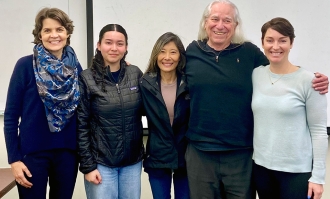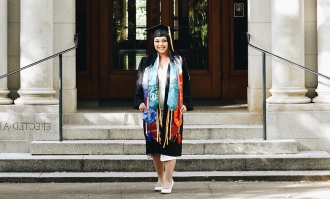- News
- News Archive
- OT Graduate Students With PPE Doing In-Person Lab Work
OT Graduate Students With PPE Doing In-Person Lab Work

Only five weeks into the fall 2020 semester graduate students in Dominican University of California’s Department of Occupational Therapy have adapted to both the expected and unexpected challenges brought by COVID-19.
Mastering the hands-on skills so vital to their profession while wearing layers of personal protective equipment (PPE) has been tougher than expected. A recent heatwave, during which temperatures soared throughout Northern California, did not help.
“Fun Fact: PPE retains more heat than I previously thought imaginable,” remarks grad student Brianna Baisch. “Sweat dripping down your back in the lab has become a regular occurrence. However, our cohort’s perseverance and excitement to learn is contagious. We continue to stay hydrated, focused, and just happy to see each other’s faces — even through a mask and face shield.”
When Dominican’s fall semester began in August, Dominican offered a variety of delivery modes, including online, hybrid, and in-person instruction. State of California guidelines permitted some essential workforce and experiential learning courses — including Occupational Therapy courses — to be delivered in-person on campus.
“As an essential professional program, the OT department continues to selectively choose essential in-person experiential learning that cannot be substituted with online learning and brings students back to campus,” says Dr. Kitsum Li, Program Director and Associate Professor of OT in the School of Health and Natural Sciences.
To ensure the students returned to the Meadowlands Hall labs in a safe and organized manner, a team of dedicated faculty and staff worked tirelessly throughout the summer to ensure safety and flexibility would be woven into all in-person interactions.
Request More Information About Dominican's Graduate Programs
Li credits the team of Julia Wilbarger, Associate Professor and Chair; Claire Murphy, Instructional Resources Coordinator; Diane Griffeath, Program Administrator; and Barbara McCamish, Director of Clinical Simulation Services, for planning detailed risk mitigation strategies to successfully bring students back to their labs and classrooms.
The team developed a guiding document that classifies lab activities into low, moderate and high risks with corresponding mitigation strategies. According to the classification, students are provided with PPE, including procedural masks, face shields, disposable gloves, and disposable gowns as appropriate. Table-top standing shields are used as another layer of protection, and students are kept in a "pod" of consistent partners in order to reduce the risk of the virus spreading.
“With all of the above procedures in place, our students and faculty feel very safe in returning to campus for in-person lab activities, even when some of the activities require closer contact such as bodily transfer training,” Li says. “Our students are engaging in their learning in this safe environment and are happy that their professional training is being delivered in a high level of safety and rigor.”
For many of the students studying for their master’s degree in occupational therapy, wearing PPE is a way of not only keeping themselves safe, but also showing respect for the health and safety of others.
“There's no doubt about the anxiety and uncertainty facing us as learners in this new way of living, but for me returning to campus with full PPE in the OT labs was an act of community building like we've never experienced before as a cohort,” says student Shasta Rice.
“Each moment spent carefully following protocol is an act of empathy for your fellow students and everyone within their social bubble,” Shasta adds. “My parents are older and immunocompromised, so being able to safely spend time with my cohort and learn together not only has immense educational value but is also socially rejuvenating.”
Student Sabrina Anne Cezar praises the Dominican faculty for continually supporting their students during these times of uncertainty and unrest.
“As we transitioned back to in-person labs, the OT department has been dedicated and on top of making sure we take the proper precautions through COVID testing, daily health screenings, providing students with full PPE, and most importantly, by respecting our autonomy,” Sabrina says. “It has been a joy to be reunited with professors and cohort members. I can't emphasize enough how, even in a time of uncertainty, in-person labs continue to feel natural and so fulfilling — even with all the PPE.”
Kristin Jones, Assistant Professor of OT, has been impressed by the students’ attitudes and their focus on being both flexible and conscientious.
“They took the precautions very seriously but didn't let it get in the way of their learning. Even on some of the hottest days, they did not complain about the heat or that they had to be in class but were supportive of each other and spent time focusing on their learning,” she says. “I really appreciate how conscientious the students were. I have immunocompromised members in my family and I was comfortable teaching because I experienced how conscientious the students were during in-person learning.”
For Li, engaging with the students and experiencing their willingness to learn in spite of the extra barriers with shields, masks, and gowns has been inspiring — and energizing — during even the toughest days. The students remain inquisitive and determined to forge forward despite the pandemic.
“I was driving home after an exhausting day of 6-hour in-person labs with the students. My body was achy and sticky! It was hot wearing the disposable gown, gloves and face shield on top of the face masks all day long!,” Li says. “Yet, every time I thought of how engaging the students were, how they all came prepared to learn in spite of the extra barriers with shields and gowns, and how they were silently enduring the heat and yet cleaning every piece of equipment that they have touched, I was just impressed beyond what words can describe.”
Student Quyntz Ellenwood sums it up nicely:
“If you look at our situation, it is just so OT of us to adapt to our environment. We face uncertainty and we choose to make friends with it, and we ask it: `What can we do to better embrace your presence?’ "
Dominican’s OT student share their experiences working in the lab during COVID.
“Full PPE is something that I haven’t had to wear for any period of time in my personal or professional experience, so having to wear it for extended times in labs has been a learning curve. The fact is, the world that we used to live in is a world that is forever changed because of COVID-19. For some of us, depending on how long this pandemic rides out, we may be having to navigate working as a new clinician all while donning full PPE and that is something that I keep reminding myself. If anything, getting to return to campus is a good real-life practice of the world we might soon be working in. I feel fortunate that we are given the opportunity to still learn in person, even if it’s not as often as before.” — Kyndra Menefee.
“Learning in person in any capacity mitigated the increased effects of imposter syndrome my cohort members and I have discussed facing due to virtual learning. It was comforting to be able to spend time together again even in modified circumstances as I trust my cohort to follow set guidelines more than my other pre-shutdown social contacts who I've had to cease physical interaction with for the sake of my fieldwork clients. It is easier than ever to feel alienated, isolated, and withdrawn into that anxiety pit wondering how safe you truly are and when things may ever get better, but the steps taken to keep us safe have made returning to campus feel like a peaceful breath instead of just another threat to add to the list.” — Shasta Rice.
“Using PPE in labs for the OT program serves the purpose of the type of precautions students will experience when working in the clinical setting. Wearing PPE in the classroom prepares and educates OT students how to use these materials and to become comfortable when working with patients in the future. Whether it's navigating PPE and focusing on coursework or wearing PPE and guiding patients towards recovery, being adaptable is key” — Rena Ribeiro.
“It really helps me to acknowledge that this is a strange time and that’s it difficult to learn when there are three layers of equipment between you and your teacher, but if we acknowledge the weird and the uncomfortable and embrace it, we take away its power over us. I think that in the long run this experience will make us more compassionate therapists who have a personal connection to what it’s like to have outside forces prevent you from engaging in your daily occupations. As OTs, helping people learn to adapt and overcome is one of our greatest assets, now we will be able to say we’ve done it for ourselves and our classmates as well! — Julia McMahon.
The Dominican Experience
Experience Personal Growth
Experience Connectedness
Experience Accomplishment
The Dominican Experience allows you to work with a coach, complete a signature work, build a digital portfolio and engage with the community. What will your experience look like?



